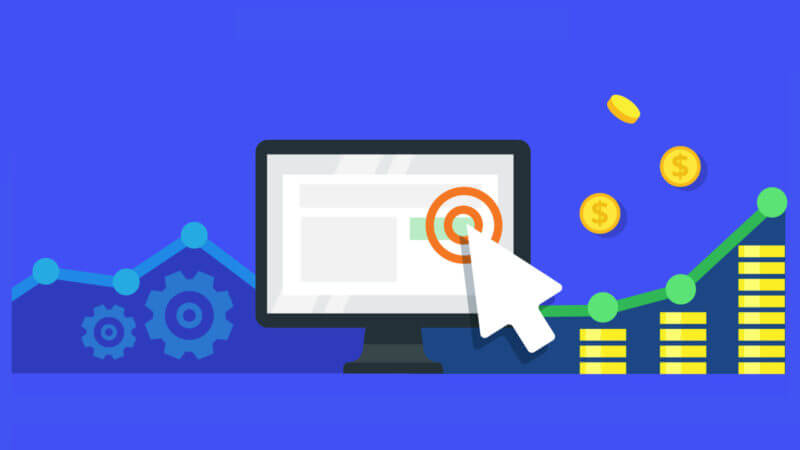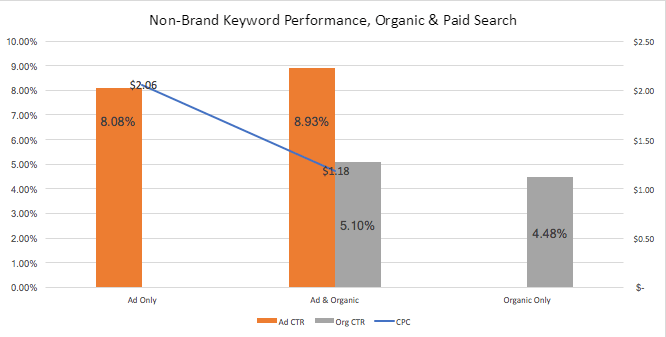
Oftentimes I’m asked, “Why should I invest in paid media when I already rank in position one for many organic search results?” Well, to answer that simply, investing simultaneously in PPC and SEO can and will result in an incremental rise in your brand’s bottom line. And we have the data to prove it.
The main synergy between the two lies in monitoring two factors: advertising spend and rankings. Whether your goal is to lower cost per click (CPC) or increase total traffic, SERP (search engine results page) position can inform how we manage paid search ads. At our agency (ZOG Digital), our teams work without silos and integrate performance data regularly. In analyzing a few accounts further as a sample set, we began to identify a correlation larger than previously understood between ad CTR (click-through rate), organic CTR and cost per click for the keywords.
To verify the connection between organic and paid search, we tracked high-traffic keywords and their positions across both channels. While both have the innate ability to show success in their own right, our data shows how each positively influences the other.
SEO and paid search need to work together
Optimal online marketing campaigns all come down to the key performance indicators. Once an SEO campaign begins, it can take time to set in and see results. Paid search’s core strength is that it allows for short-term performance with better visibility on specific queries. What binds them together is visibility on a SERP — with the right tools, marketers can influence position against competing results.
It’s no secret that SEO is more sustainable long-term, but it can take a long time before results are realized. A PPC (pay-per-click) tactic can help to offset limited SEO results at the early stages of an SEO campaign; it also informs keyword and content strategies for organic keyword targeting and content development.
With well-informed and properly implemented optimizations, organic positions will rise. Once they move up through page one, we’ve identified numerous ways in which PPC costs reduce naturally and how they can be strategically managed.
Improve CTR and decrease CPC
At ZOG Digital, we see a clear performance increase when brands employ both PPC and SEO. For example, after evaluating our book of business, we found that accounts implementing both PPC and SEO strategies saw a higher click-through rate for both organic and paid search efforts — as well as lower cost per click in paid search. Specifically, we organized the data by keywords — we have keywords with active search ads, keywords with search optimizations (organic rankings) and keywords with both active tactics.
For non-branded keywords that have both a paid and organic presence, we saw a CTR of 8.93 percent for paid search and 5.10 percent for organic search, across all positions. When we isolate the tactics, paid search CTR is 8.08 percent, while organic search sits at 4.48 percent. By just looking at those numbers, we can see that keywords with a presence on both paid and organic results yield a combined incremental CTR.

Also shown in the graph is cost per click (CPC), where paid search alone sits at an average CPC of $2.06, whereas the CPC for keywords with an organic presence sits at $1.18.
In analyzing this drop in CPC, we found that nearly all paid keywords with an organic presence had a higher Quality Score than paid keywords without an organic presence. This could occur as a result of higher CTRs from greater SERP exposure and/or richer content. It could also result from keyword relevance gained from landing pages optimized for organic search. Regardless of why PPC quality score is higher for overlapping keywords, the justification exists to apply a keyword strategy that incorporates both paid and organic tactics.
An incremental increase in CTR and reduced CPCs can certainly be beneficial, but as search marketing practitioners, the natural tendency is to do something with this data and improve performance even further. We’ve found that one of the most effective paid+organic optimizations comes from adjusting bids and ad positions based on organic visibility. This isn’t an optimization practice that can be applied to all overlapping keywords, but with some data filtering and testing, CPC costs can be reduced further.
Our team tests and analyzes ad positions against multiple organic positions on the first page; these tests have proven that competitive keywords with costly CPCs can often be efficiently targeted by reducing bids and dropping ad position when a client is ranking in the top few organic positions. This is not a blanket strategy, and keywords need to be tested, but we’ve found the best approach is focused on a balance between incrementality (clicks) and cost (CPCs).
Monitor SERP competitors closely
But it’s not enough to just monitor and synchronize your work for an account. You have to track your competitors, too. Without direct access to their analytics or ad platforms, you’ll never have a clear picture of what they’re doing, but you can estimate by manually monitoring the SERP with specific insight reports, and by using third-party tools.
Within AdWords, you can access the auction insights report. This report allows you to evaluate domains that are currently bidding on specific keywords. It provides a snapshot of your competitive landscape.
You can also use the Domain vs. Domain tool within SEMrush to analyze competitors’ search engine presence and backlinks. If you need to use this tool to get more granular, you can map out a SERP footprint to have an analysis on more specific competitors.
You’ll be able to identify relevant keywords and terms that you should consider bidding on, but it’s up to you to take that information, evaluate your own internal data and strategize on how to allocate budget.
Final thoughts
When used together, SEO and PPC move from two channels into one to help achieve clear outcomes: more qualified traffic and budgetary efficiency. As with any search marketing initiative, regular testing is required, but the results will exceed the effort, and the insights gained will help marketers consider search opportunities in new ways.
Some opinions expressed in this article may be those of a guest author and not necessarily Search Engine Land. Staff authors are listed here.
